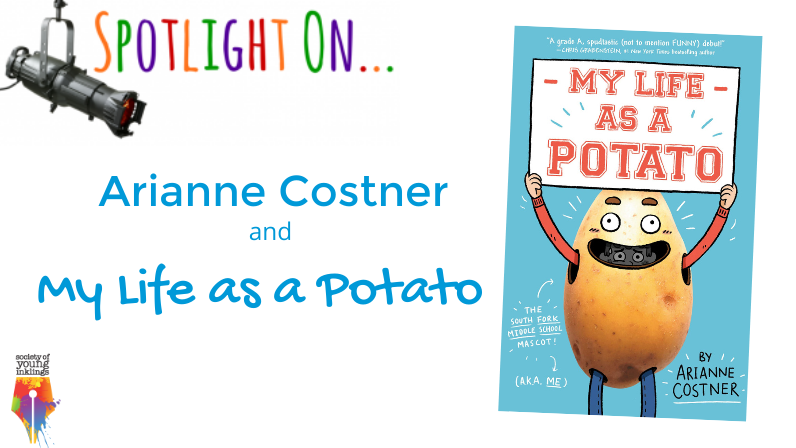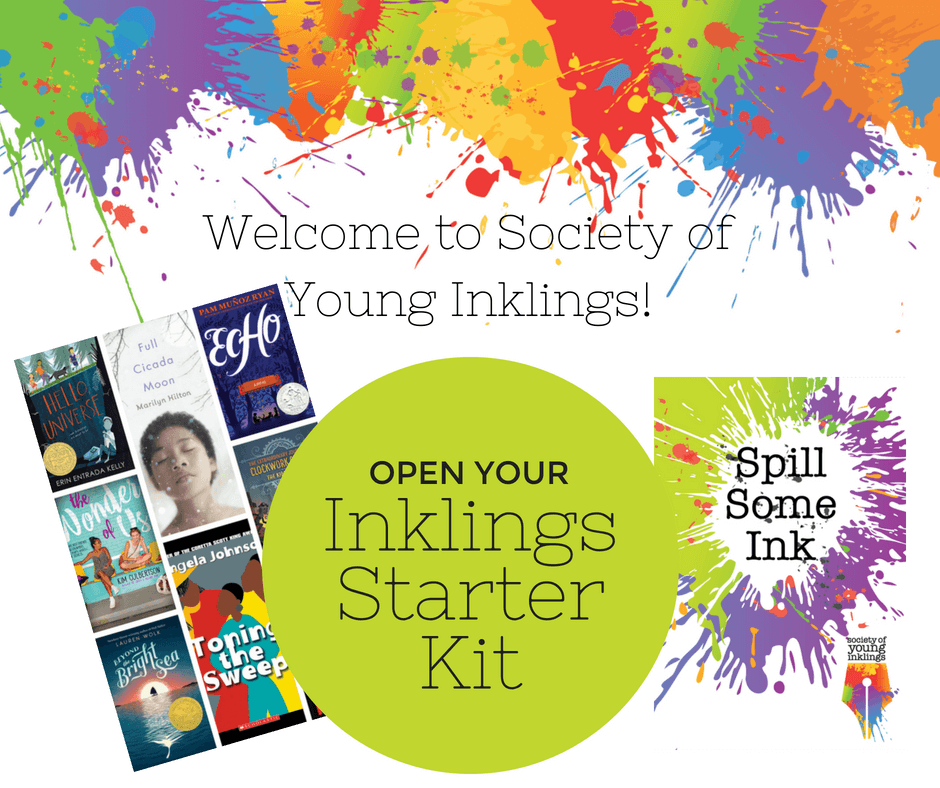For our April issue of Inksplat, we had a great time chatting with Arianne Costner, author of My Life as a Potato about how we have all had times where we were embarrassed or wanted to hide something about ourselves from others. She encourages us to remember that “even though we all go through different experiences, we all feel the same emotions.”

Writing Challenge
This month, your writing challenge involves changing things up! When Arianne gets bored with a story, she asks herself what exciting thing can happen. “What’s a big thing I can add right now that would make sense?” Often this involves a change of scenery. This can also be fun as a writing exercise outside the flow of the story.
This month’s challenge: throw your main character (or a character you love) into a totally new and dangerous setting and write a scene showing how they react. Are they on a sinking boat? Lost on a mountain? Experiencing the zombie apocalypse?

An Interview with Arianna Costner
Let’s talk about your middle-grade novel My Life as a Potato. How were you inspired to write it?
I was at a volleyball game with my husband, and there was a cougar mascot down on the court dancing. Mascots are always anonymous and I thought, What would it be like to be a mascot and be able to be so goofy and weird, and no one would know who you were? You can live this double life, and I love stories where people are living a double life. So, I told my husband I think I want to write a book about a kid who is secretly the mascot, and he suggested a potato mascot because Idaho has potato mascots. I thought that was such a funny idea, and also my students at the time thought potatoes were really funny; they were always drawing pictures of them. So, once I heard that idea, I immediately fell in love with it and started plotting the book in my head.
How do you make the reader relate to the character even when the character is going through something no reader would do?
Even though we all go through different experiences, we all feel the same emotions. So even if for My Life as a Potato, none of the readers have been a potato mascot before, I’m sure they’ve felt embarrassed or wanted to hide something about themselves. Maybe they’ve felt like some kids are more popular than they are. Even though the situation is different, the emotion is relatable.
Your novel uses lots of humor to great effect. How do you come up with humorous ideas? Is it ever difficult to work them into the story?
I don’t feel like I’m a super funny person naturally. I rely a lot on situational humor, and there has to be a sense of irony to the situation to create humor. For example, Ben hates potatoes, and he talks about all these ridiculous things that potatoes have done to him in the past. Then, he ends up getting pressured to throw a hotdog in the cafeteria, and, lo and behold, it’s because he threw the hotdog that he tripped the potato mascot and now has to be a potato. So you see how there are just layers of irony and that sets things up for a lot of jokes and quips that his friends can make. Always think, “How can I make this funnier? How can I push this further? How can I make this a little sillier or more ironic?”
How do you keep up your writing momentum?
I do this thing called ugly drafting where I tell myself it does not matter how ugly this is. It doesn’t matter if there are periods; it doesn’t matter if there are quotation marks. I am just going to type through this whole plot and see what happens, make up random things, and probably throw away ninety percent of it. When I do that, I find that maybe out of a whole two to three pages of ugly drafting, I’ll find three ideas or gems that I can later expand upon. Just allow yourself to write something really bad, and you don’t have to go back and erase it or edit it. You can always change it later.
Do you have any tips for internal monologue?
Interior monologue is a good place to bring out themes, how the character’s growing, and what the character’s thinking. My character will say in their head something to respond to what has happened, and it reveals something about the character–something that he believes isn’t true or something that he needs. It also reveals how he views the world around him. Sprinkle in a couple of sentences here and there whenever something happens. Your character has to react, they have to feel something, and there has to be a reason why they feel that way. You’re trying to show the reader how the character needs to grow.

INKLINGS CONNECT
Summer Camps
Join us for a writing camp this summer. We can't wait to see what you create!
Keep your creativity flowing with our upcoming community events:

Thank you, Arianne, for sharing with us! You can find out more about Arianne’s work at https://ariannecostner.com/
Arianne Costner lives in the middle of the desert with her husband and three children. She is a former English teacher who believes that writers should crack up at their own jokes. When she isn’t writing, she can be found playing the piano and composing music. Her favorite kind of potato is the tater tot, with mashed potatoes coming in close second—as long as they’re not gluey.
SPARK YOUR CREATIVITY!
Subscribe to our monthly Ink Splat for an exclusive author interview, a writing challenge, and other fun (and free!) goodies, curated especially for youth writers.
As a bonus gift, we’ll send you an Inklings Starter Kit packed with creativity-sparking fun.


